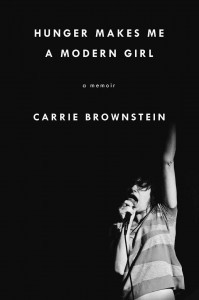Turn Down the Music and Read: Hunger Makes Me a Modern Girl
 As much as I have admired Carrie Brownstein, one third of punk/rock band Sleater-Kinney and one half of the brains behind Portlandia, it was the first page of Chapter One of her new memoir, Hunger Makes Me A Modern Girl (Riverhead, 2015) that made me fall for her completely. “My story starts with me as a fan,” she writes, going on to describe, in a way that I’ve never seen so beautifully articulated, what it feels like to be a fan – that concerts aren’t so much about the music as they are about the feeling of being there in community, about nostalgia, about the way music colors the world in which we live. I’d recommend this book based on Page 1 all by itself.
As much as I have admired Carrie Brownstein, one third of punk/rock band Sleater-Kinney and one half of the brains behind Portlandia, it was the first page of Chapter One of her new memoir, Hunger Makes Me A Modern Girl (Riverhead, 2015) that made me fall for her completely. “My story starts with me as a fan,” she writes, going on to describe, in a way that I’ve never seen so beautifully articulated, what it feels like to be a fan – that concerts aren’t so much about the music as they are about the feeling of being there in community, about nostalgia, about the way music colors the world in which we live. I’d recommend this book based on Page 1 all by itself.
But wait, there’s more!
Brownstein writes with the same dry-eyed objectivity and wit that you’d expect having seen Portlandia, but in Hunger also pulls back the curtain on the passion, the drive, and the obstacles that took her from being that music fan pressed against the barriers at a B-52s show to being part of a band that acclaimed rock critic Greil Marcus declared “the greatest rock band in the world” in 2001.
Brownstein, along with bandmates Corin Tucker and Janet Weiss, created a sound that gets lumped in with the Riot Grrrl movement, but after reading Hunger I’m less eager to apply those feminized labels to their sound. Brownstein makes the point, politely but relentlessly, that no male musicians are asked “How does it feel to be in an all-male band?” or “How does being a father affect your music?” They’re just really excellent and innovative punk musicians. It would be nice if it could just be left at that.
I once took a fiction writing workshop where our instructor used a Sleater-Kinney song to teach the concept of “voice” – how creating crisp, identifiable voices for various characters drives the urgency of the plot. Listen to the dialog back and forth on this breakup song – one voice high and tremulous, the other low and urgent, no question of blurring the two characters. I think of it a lot.
Family wise, Brownstein had a tough row to hoe, but she writes about her parents with warmth and empathy. That tone carries through in how she describes her bandmates, even ones who were kicked out along the way, even the ones she dated and then broke up with. If you’re looking for a dishy, disrespectful tell-all, move on to a New Order book. Brownstein emanates niceness and normalcy; it’s a wonder she made it in rock.
I mean, when Sleater-Kinney broke up in 2006, her first instinct was to go volunteer at an animal shelter, where she won a “Volunteer of the Year” award. Consider that Eddie Vedder showed up at their last show and “…He stood up there in front of our crowd this time, ukulele in hand, and said that he’d always wished he had been able to see the Beatles or Led Zepelin in their prime, or Keith Moon play with the Who, but that he felt lucky to have seen Sleater-Kinney.” It’s like John Lennon showing up at the animal shelter offering to socialize the cats.
In 2012, six years after they last played together, Brownstein and Tucker were hanging out because of course they’re still buddies, unlike pretty much every other musician who gets a memoir contract, and the result was this year’s No Cities To Love, one of my favorite albums of the year. There’s still so much there there.
About the only complaint I have about this book is because I love Portlandia and would have happily read 150 pages on it; I think she gave it two words and those words were “Fred Armisen.” Different topic. Different book. But I do understand now what the impulse was to write this skit.
Did you get a bookstore gift certificate for Christmas? Spend it on this book. An iTunes gift card? Buy No Cities to Love. Get a puppy or a kitten? Carrie would definitely approve.










 Related StoriesTurn Down the Music and Read: Mo’ Meta BluesHoliday Shopping Recs 2015Turn Down the Music and Read: The Jesus and Mary Chain – Barbed Wire Kisses
Related StoriesTurn Down the Music and Read: Mo’ Meta BluesHoliday Shopping Recs 2015Turn Down the Music and Read: The Jesus and Mary Chain – Barbed Wire Kisses



